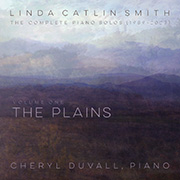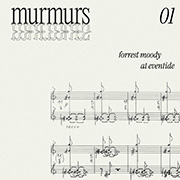 Linda Catlin Smith: The Complete Piano Solos (1989-2023), Volume One: The Plains [Redshift]. The promised edition of Linda Catlin Smith’s piano music begins at the end with her most recent work for the solo instrument. The Plains is an hour-plus excursion in a single movement, composed at the request of the pianist heard here, Cheryl Duvall. (Duvall has previously appeared on Dark Flower, a set of Smith’s solo and ensemble pieces.) This is an unusual piece for Smith, marking a new and potentially disturbing direction in her work. She has composed long works before (an opera, the multi-movement violin and percussion duet Dirt Road) but in comparison The Plains are unadorned, even barren. It begins with a single note held for fifteen seconds, then a single chord is reiterated in a monotonous vamp. The vamp eventually opens up into more diverse forms, with changes in chords and rhythm until the idea is more implicit than heard. There are sectional changes throughout the work, but everything sounds at first as background, an accompaniment to a melodic line that always seems imminent but never appears. New developments are always muted, more apparent in retrospect, obscured by the music remaining steadily in the lower middle register. When something melodic finally appears, it’s as a slow figure in the bass. We’re about halfway through before any higher-pitched notes make their presence felt. I assume that Smith and Duvall each worked on this piece with the aim of making it as resolutely unobtrusive as possible and thus, like on a long journey through open landscape, impress with an unyielding image despite any surface variations along the way. Duvall gives attention to the smallest differences in dynamics and voicing to produce a wide landscape in low relief. That landscape is not so much forbidding as indifferent, much like the one evoked Kory Reeder’s string quartet Homestead, alien to European experience and where the pleasures to be taken from it are not immediately obvious to a newcomer. Three more albums of Smith’s piano music are in preparation, and Duvall has been commissioning hour-long pieces from other Canadian composers. Point of order: those are hills on the cover.
Linda Catlin Smith: The Complete Piano Solos (1989-2023), Volume One: The Plains [Redshift]. The promised edition of Linda Catlin Smith’s piano music begins at the end with her most recent work for the solo instrument. The Plains is an hour-plus excursion in a single movement, composed at the request of the pianist heard here, Cheryl Duvall. (Duvall has previously appeared on Dark Flower, a set of Smith’s solo and ensemble pieces.) This is an unusual piece for Smith, marking a new and potentially disturbing direction in her work. She has composed long works before (an opera, the multi-movement violin and percussion duet Dirt Road) but in comparison The Plains are unadorned, even barren. It begins with a single note held for fifteen seconds, then a single chord is reiterated in a monotonous vamp. The vamp eventually opens up into more diverse forms, with changes in chords and rhythm until the idea is more implicit than heard. There are sectional changes throughout the work, but everything sounds at first as background, an accompaniment to a melodic line that always seems imminent but never appears. New developments are always muted, more apparent in retrospect, obscured by the music remaining steadily in the lower middle register. When something melodic finally appears, it’s as a slow figure in the bass. We’re about halfway through before any higher-pitched notes make their presence felt. I assume that Smith and Duvall each worked on this piece with the aim of making it as resolutely unobtrusive as possible and thus, like on a long journey through open landscape, impress with an unyielding image despite any surface variations along the way. Duvall gives attention to the smallest differences in dynamics and voicing to produce a wide landscape in low relief. That landscape is not so much forbidding as indifferent, much like the one evoked Kory Reeder’s string quartet Homestead, alien to European experience and where the pleasures to be taken from it are not immediately obvious to a newcomer. Three more albums of Smith’s piano music are in preparation, and Duvall has been commissioning hour-long pieces from other Canadian composers. Point of order: those are hills on the cover.
 Forrest Moody: at eventide [Murmurs]. Moody himself is the pianist for this seventy-minute solo composition. This is all I know of his stuff as a composer (he has played on some of Eden Lonsdale’s ensemble pieces). I don’t want to call at eventide an obsessive work, so let’s just say that Moody is very thorough here. The beginning of the score on the front cover gives you an idea: closely-positioned chords with an emphasis on overtones, secco. Any feeling of flow from one chord to the next is blocked by the dead stop between one chord and the next. Industrious use of the pedals control the release and choke of lingering tones, giving at times some uncanny filtering effects to the chords. The piano is close-miked, so the soft thudding of the dampers and pedals throughout the work add a tensioning counterpoint to the steady succession of string sounds. As with the Smith piece, it starts out with a narrow range of pitch; unlike Smith, Moody doggedly stays within this frequency band, rarely ventilating the close atmosphere with an occasional bass note or a slow run of single notes that ascend into the treble. As with many other long works, it settles into its own sense of time and thus creates a space in which it may be contemplated on its own terms, but with its determination to dwell upon the same spot for so long it can become enervating. Moody’s musical ideas do start to soften up in the latter half, once in a while at least, and so some development of character does arise of its own accord. Despite this, once those ideas have been illustrated, it does feel like he runs out of things to say: the piece benefits from being long, but nothing about it seems to insist that it must be this particular length. Except perhaps, for the sake of endurance, that we follow Moody with every step as he pursues this line of interrogation; not necessarily obsessive, just thorough.
Forrest Moody: at eventide [Murmurs]. Moody himself is the pianist for this seventy-minute solo composition. This is all I know of his stuff as a composer (he has played on some of Eden Lonsdale’s ensemble pieces). I don’t want to call at eventide an obsessive work, so let’s just say that Moody is very thorough here. The beginning of the score on the front cover gives you an idea: closely-positioned chords with an emphasis on overtones, secco. Any feeling of flow from one chord to the next is blocked by the dead stop between one chord and the next. Industrious use of the pedals control the release and choke of lingering tones, giving at times some uncanny filtering effects to the chords. The piano is close-miked, so the soft thudding of the dampers and pedals throughout the work add a tensioning counterpoint to the steady succession of string sounds. As with the Smith piece, it starts out with a narrow range of pitch; unlike Smith, Moody doggedly stays within this frequency band, rarely ventilating the close atmosphere with an occasional bass note or a slow run of single notes that ascend into the treble. As with many other long works, it settles into its own sense of time and thus creates a space in which it may be contemplated on its own terms, but with its determination to dwell upon the same spot for so long it can become enervating. Moody’s musical ideas do start to soften up in the latter half, once in a while at least, and so some development of character does arise of its own accord. Despite this, once those ideas have been illustrated, it does feel like he runs out of things to say: the piece benefits from being long, but nothing about it seems to insist that it must be this particular length. Except perhaps, for the sake of endurance, that we follow Moody with every step as he pursues this line of interrogation; not necessarily obsessive, just thorough.
